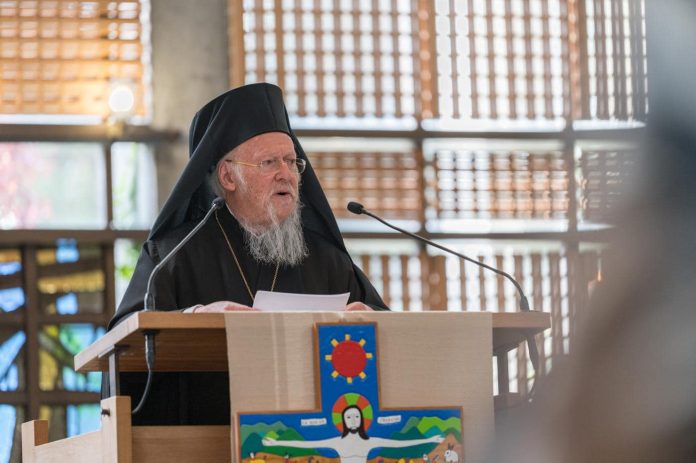Once again, we gather as the World Council of Churches to pursue and actively seek our unity in Christ – in mind, in heart, in spirit, and in practical reality. In this reality, where division is sown daily in the human family, our task is all the more urgent,” His All Holiness Ecumenical Patriarch Bartholomew said in his sermon.
“The Church of Constantinople shares also the joy of the 75th anniversary of the establishment of the World Council of Churches, as one of its founding members,” he continued.
Patriarch Bartholomew recalled how in 1920 the Ecumenical Patriarchate issued an encyclical addressed “Unto the Churches of Christ everywhere.”
This served as what the patriarch described as a “constitutional charter” for the process that led to the WCC’s foundation in 1948.
The chapel of the Ecumenical Centre in Geneva, where the WCC has its offices, was filled for the opening prayer, which had hymns, readings, and prayers in Armenian, English, French, German, Spanish, and Swahili.
The WCC central committee usually meets every two years and serves as the chief governing body of the WCC between assemblies.
This year’s meeting is the first since the central committee was elected at the WCC’s 11th Assembly in Karlsruhe, Germany, in 2022.
Central committee members remembered in prayer the wisdom, knowledge, gifts, and commitment to unity of those active in the ecumenical movement who had died since the previous central committee meeting in 2022.
Special tributes were offered to Canon Dr Agnes Abuom, of the Anglican Church of Kenya, who died of acute heart failure on 31 May, having served as moderator of the WCC central committee from 2013 to 2022.
In his sermon, Patriarch Bartholomew described how Christians are called to be disciples and followers of Christ, and members of his body, the Church.
“We all may have different perceptions about what, where, and how the Church is constituted, but there can be no doubt about the sign of a true disciple,” he continued. “Only love for each other, and our love for an unloved world manifests our worthiness to bear the name ‘Christian.’”
Patriarch Bartholomew referred during his sermon to the Russian invasion of Ukraine in 2022 which had created a “deep wound” in world Orthodoxy and had profoundly injured the “Orthodox Christian dedication to our own essential oneness.”
He thanked the WCC for standing “in the court of the Prince of Peace,” and for the support it had given to Ukraine and its people. He said all should pray for a “swift and righteous” conclusion to the war.

He also called for recommitment to unselfish and empathetic love for one another and for eight billion fellow human beings in the world.
“It is the ultimate ecumenical expression, because without such love, our inter-Christian witness will never be taken seriously by the world, or, perhaps, even by our own communities,” said Patriarch Bartholomew.
“Let this love be the ‘work’ . . . the chief and principal labour of all our cooperative efforts. After two thousand long, complex, and complicated years, the churches cannot hide from the world. And after seventy five brief years, neither can the World Council of Churches.”
Hymns and prayers during the service were drawn from the spiritual life resources of the WCC 6th Assembly, held 40 years ago in 1983 in Vancouver, Canada.
The prayer concluded with the hymn “Jesus, where can we find you, in our world today?” with words and music composed by Doreen Potter (1925-1980), who was married to Philip Potter, WCC general secretary from 1972 to 1984.
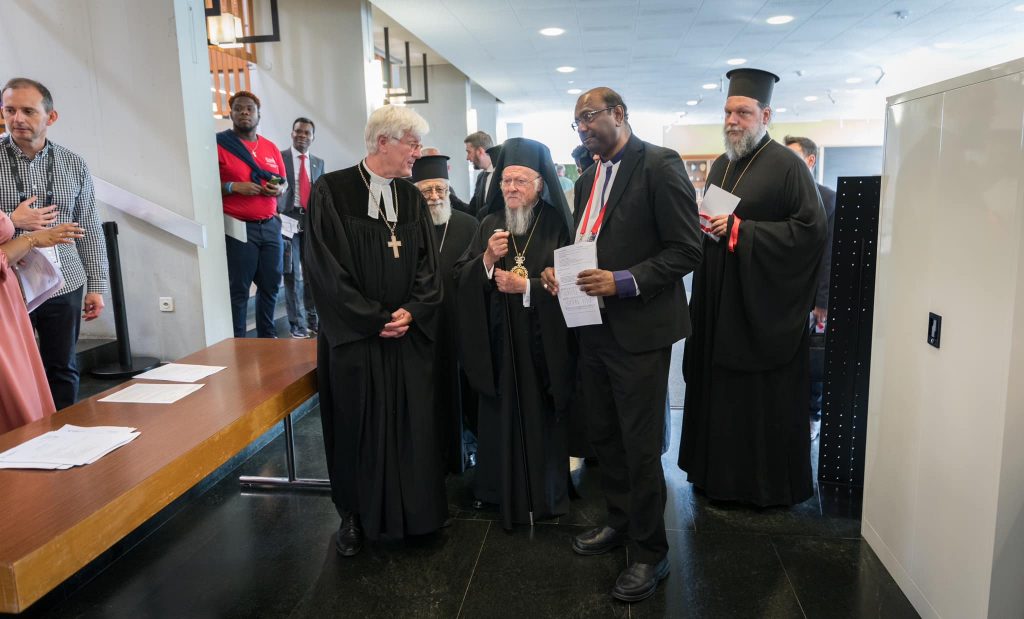
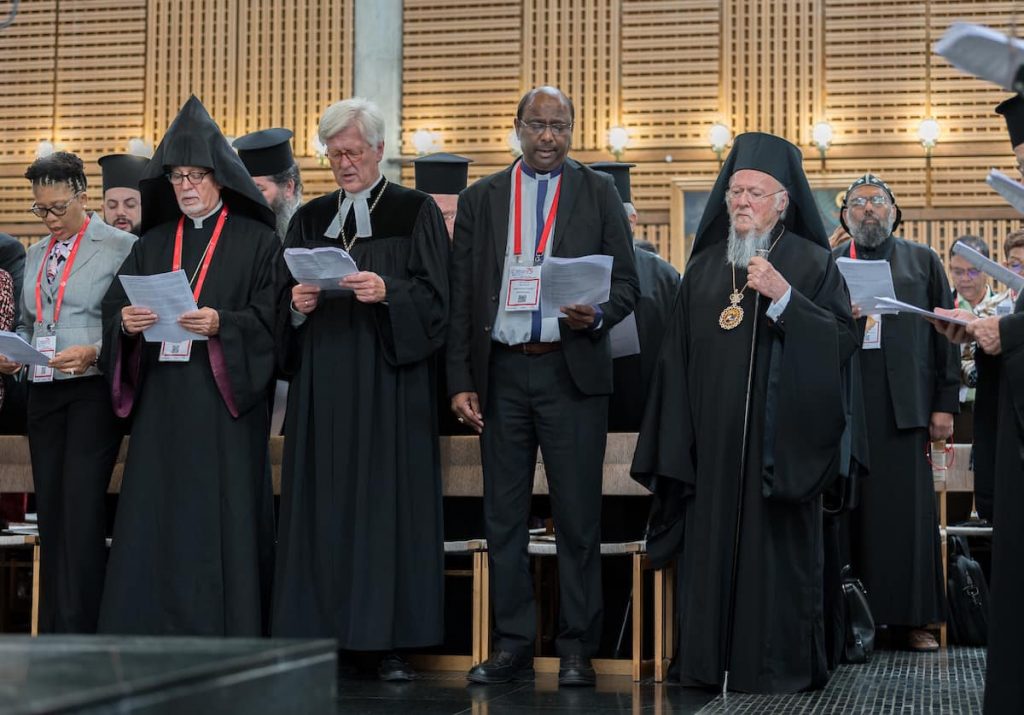
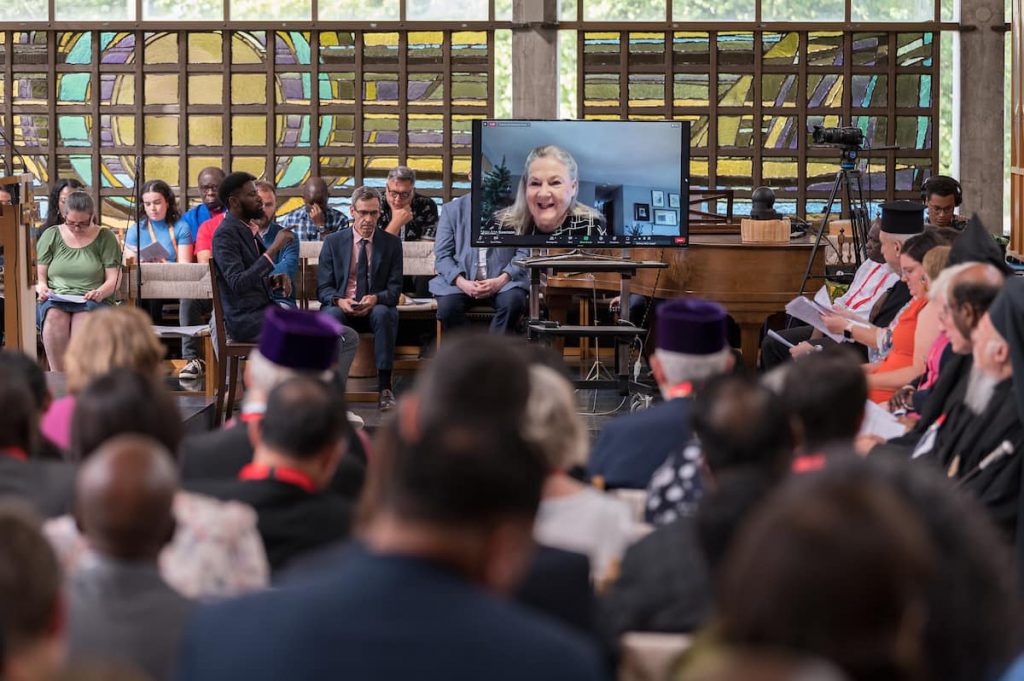
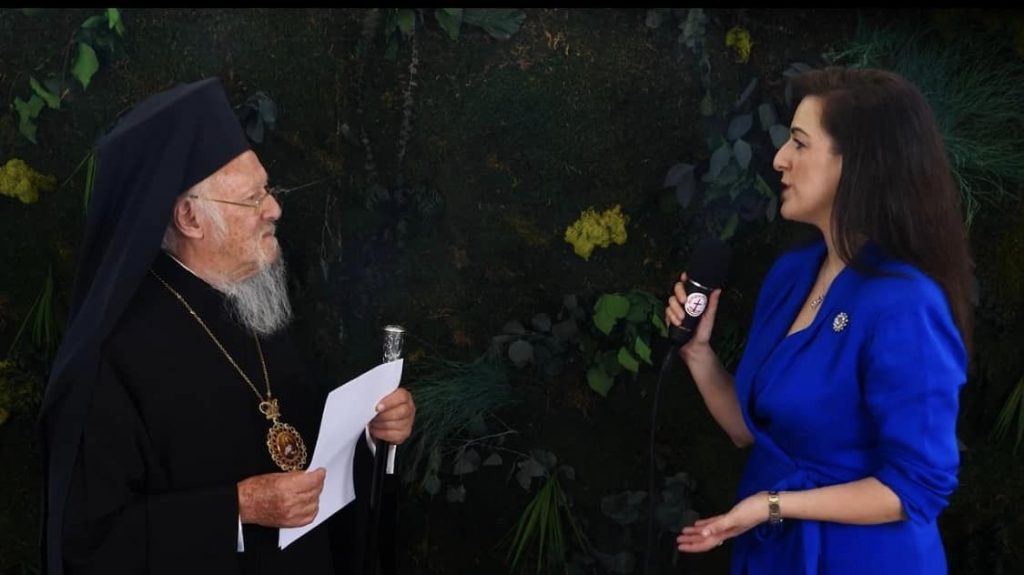
Homily of His All-Holiness Ecumenical Patriarch Bartholomew at the Opening Prayer of the Central Committee of the World Council Of Churches, taking place on 21-27 June 2023 in Geneva, Switzerland.
Beloved Sisters and Brothers in Christ,
Once again, we gather as the World Council of Churches to pursue and actively seek our unity in Christ – in mind, in heart, in spirit, and in practical reality. In this world, where division is sown daily in the human family, our task is all the more urgent.
The Ecumenical Patriarchate embraces with love and respect all who strive toward this longed-for goal – from every side and every actor in ecclesial affairs—and continues its mission to reach out across all Christian communities, to find the common ground that allows us to discover our unity in Christ – the unity that He prayed for, and which is our ultimate destiny in Him.
The Church of Constantinople shares also the joy of the 75th anniversary of the establishment of the World Council of Churches, as one of its founding members. The Holy Great Church of Christ takes no less pride in highlighting the inspirational role that the famous Synodal Encyclical of 1920 played as the “constitutional charter” of the process that led to the Council’s foundation back in 1948. Over a century ago, this Encyclical prophetically pointed out—among other things—the dangers that can “attack the very foundations of the Christian faith and the essence of Christian life and society,” such as war, which brings to light “many unhealthy symptoms in the life of the Christian peoples,” and often reveals a “great lack of respect even for the elementary principles of justice and charity.”
Indeed, the Orthodox Christian dedication to our own essential oneness has been profoundly injured by the invasion of Ukraine by the Russian Federation in February 2022. This deep wound, which has spread to World Orthodoxy, has yet to find a “Balm of Gilead” to assuage the pain, the loss, and the cynical realpolitik that has been foisted upon the Orthodox Church.
We express our gratitude to the World Council of Churches for standing in the court of the Prince of Peace and for supporting the nascent democracy of Ukraine and the pious and noble Ukrainian people. Even now, the ecclesiastical presence of the Moscow Patriarchate in Ukraine seeks ways to disambiguate itself from the aggressor State Church under Patriarch Kirill. We say “State” Church, because the proof is in the alignment, not the self-assertion. This sharp and grievous reality has already caused generational harm to the future of Orthodox Christianity in the Slavic Lands. We all pray for a swift and righteous conclusion to this unnecessary imperialist campaign and an end to the needless and heedless politicization of the Church in Russia. We cannot, and we must not allow the weaponization of our Christian faith to become the norm.
To this end, the text selected for our Opening Prayer is perfectly poignant. Those who had been taught and nourished by the Lord Jesus were operating on the most basic human level – that is, subsistence and survival. The Lord said to them:
Ἀμὴν ἀμὴν λέγω ὑμῖν, ζητεῖτέ με, οὐχ ὅτι εἴδετε σημεῖα, ἀλλ᾽ ὅτι ἐφάγετε ἐκ τῶν ἄρτων καὶ ἐχορτάσθητε.
Truly, truly I say to you: you seek Me, not because you saw signs, but because you ate of the loaves and were satisfied.[*]
Christ’s challenge to them was to elevate their minds and hearts – to seek after something more significant than what this world can give. And the people took the bait, as they say. They asked Him:
Τί ποιῶμεν ἵνα ἐργαζώμεθα τὰ ἔργα τοῦ Θεοῦ;
What must we do to work the works of God? [†]
And what does our Lord reply? To believe in Him – to believe that love is greater than hate, faith is greater than doubt, hope is greater than despair, and that sacrificing your life for the sake of others – by unalloyed and altruistic love – is what faith in our Lord Jesus Christ truly means. Here we come to the kernel of the seed and the way forward for all our church communities.
If we are serious about our ecumenical endeavour, and if we genuinely believe that our Lord Jesus Christ is the “Bread of God” that can sustain and nurture this world in every way, then we must “work the works of God” with renewed and enlightened diligence.
Definitions and agreements will be useless if our “orthopraxy” does not conform with our “orthodoxy.”
What use is a joint statement on peace if we are pursuing war? Especially in our technologically dominated world, where so-called “Artificial Intelligence” can mimic the artfulness of our declarations, we need, all the more, to manifest what the Lord so plainly said in another place in the Gospel of John:
Ἐν τούτῳ γνώσονται πάντες ὅτι ἐμοὶ μαθηταί ἐστε, ἐὰν ἀγάπην ἔχητε ἐν ἀλλήλοις.
By this, will all people know that you are My Disciples if you have love for one another.” [‡]
My dear and respected Sisters and Brothers in the Lord,
As you all know, to be a disciple of our Lord Christ is to be His follower, His pupil, His apprentice, and a member of His Body, the Church. We all may have different perceptions about what, where, and how the Church is constituted, but there can be no doubt about the sign of a true disciple.
Only love for each other, and our love for an unloved world manifests our worthiness to bear the name “Christian.”
If we are judged on anything on that Final Day, it will not be because we subscribed to this declaration or that affirmation. It will be whether we have in any way followed the Master on the path of love.
Therefore, as we look to the works of God that are our vocation as Christians, let us recommit to a truly unselfish and empathetic love for one another and our eight billion fellow human beings – each worthy and deserving of our love.
It is the ultimate ecumenical expression, because without such love, our inter-Christian witness will never be taken seriously by the world or, perhaps, even by our own communities. The results of love are not to be denied. They either impact what we do or they do not. And if they do not, how can we say we are Christ’s disciples?
We ask this question without rhetorical intention. In its final verse, our Gospel reading today speaks of eternal life and the resurrection. These are the long-awaited goals, the final destiny of the human family. But the journey to these is a daily living of the truth of the Gospel. And that truth cannot be hidden by any artifice of man.
Brothers and Sisters,
Let us pray that our meeting – our words to one another and our actions with one another – bear the hallmark of the love with which our Lord Jesus Christ loved us. Let this love be the “work” – τὸ ἔργον – the chief and principal labour of all our cooperative efforts.
After two thousand long, complex, and complicated years, the Churches cannot hide from the world. And after seventy-five brief years, neither can the World Council of Churches.
We have already received so much – even grace upon grace. We have been nourished and strengthened by the Bread of Heaven, Who feeds us as we are able to receive.
Now, let us manifest the strength of our hearts that the Bread of God grants us by mercy and grace. [§]
And let our strength be the power of love! To the glory of God: Father, Son, and Holy Spirit – to Whom be all honor and praise, now and ever, and unto the ages of ages.
Amen!
[*] John 6:26.
[†] John 6:28.
[‡] John 13:35.
[§] Cf. Psalm 104:15 (LXX, 103:15).

